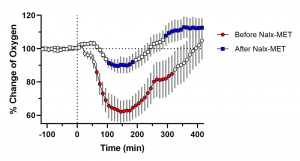 Featured Paper of the Month – June 2020.
Featured Paper of the Month – June 2020.
One of the deadliest effects of opioids, such as heroin, is respiratory depression followed by
brain hypoxia. While it is known that opioid receptors are densely expressed in both the brain
and periphery, it is widely accepted that the hypoxic effects of opioids result solely from their
direct action in the CNS. To examine the role of peripheral opioid receptors in triggering brain
hypoxia, we used oxygen sensors in freely moving rats to examine how naloxone-HCl and
naloxone-methiodide affect brain oxygen responses induced by intravenous heroin at low,
human-relevant doses. In these experiments we found that naloxone-HCl, an opioid antagonist
used to reverse opioid overdoses, eliminated brain oxygen decreases induced by heroin. We
also found that naloxone-methiodide, an opioid antagonist that cannot travel to the brain,
likewise decreased heroin-induced brain oxygen drops. The decreases in oxygen depression
induced by naloxone-methiodide were attributed to the blockage of peripheral opioid
receptors. Therefore, peripheral opioid receptors seem to play a role in triggering brain
hypoxia.
Publication Information
The Role of Peripheral Opioid Receptors in Triggering Heroin-induced Brain Hypoxia. Journal Article
In: Sci Rep, vol. 10, no. 1, pp. 833, 2020, ISSN: 2045-2322 (Electronic); 2045-2322 (Linking).
